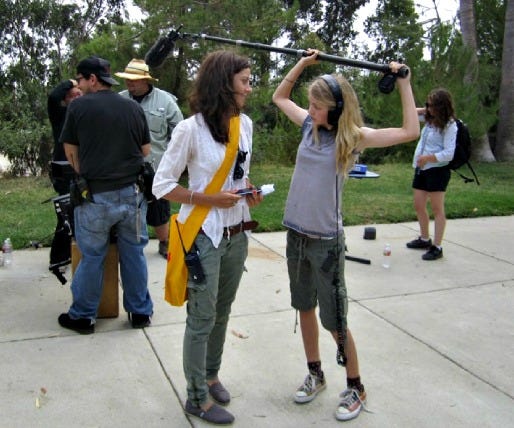Olivia Silver, writer/director of "Arcadia"

Click here for showtimes and complete details for Indy Film Fest 2012!
Olivia Silver, a first-time feature-film writer/director, took the indie film world by storm with "Arcadia," a coming-of-age road-trip drama co-starring John Hawkes as a troubled father carrying on a subtle psychological struggle with his daughter, played by Ryan Simpkins in a breakout role. Silver took some time to speak with Christopher Lloyd about making her first film.
How did you come up with the idea for this movie, and what was the screenwriting process like?
I had a writing class in my first year at UCLA Film School where we were asked to write down the first dream or memory that came to mind. Mine was a vivid memory of pulling into our new suburban driveway in L.A. at age 13, after a draining cross-country road trip. That became a scene in my thesis film at UCLA, which, in turn, became "Arcadia."
Do I have it right that this is your first feature film as a director? Tell us about how you prepared for, and went about executing, that new role.
This was my first feature film, yes. It took years to raise financing, find cast and develop the project, so there was a lot of time to focus on what I'd want to do creatively if I were ever given the keys to the vehicle, so to speak. I also spent five years in the graduate film program at UCLA where we made short films every year and worked on all our classmates' films. Since "Arcadia" was based on my short thesis film, "Little Canyon," I was able to test-drive the mood, tone and a lot of the scenes that appeared in the feature years later.
John Hawkes has really gotten a huge reputation in the indie-film world. How did he come to be involved in "Arcadia," and what was it like directing him?
We were connected to John through producer Silenn Thomas's mentorship with the excellent producer Alix Madigan, who produced "Winter's Bone," among other films. He read the script, responded to it and agreed to play the role of Tom, which was a tremendous boost to every aspect of the film. John's prodigious talent aside, he is incredibly motivated, professional, courteous and a true pleasure to work with. He gave all of himself to the film — which was more than I could have hoped for.
The performances you get out of your young actors, Ryan Simpkins, Ty Simpkins and Kendall Toole, are amazing. Ryan, in particular, communicates so much, often without speaking, and yet you never catch her "acting." How'd you do it?
How did they do it is probably the better question. They are all natural talents — totally at ease in front of the camera and willing to give deep parts of themselves. Ryan identified with the character a lot; she was the same age as Greta, going through a lot of her internal and external fluctuations, and I think this helped to make her performance utterly believable. In general with kids, I think the main thing is making sure they feel as comfortable as possible and that they know you're rooting for them.
It's a very polished-looking film, with the journey along the road containing many evocative visuals. What were you going for?
I wanted the film to have a slightly nostalgic, timeless feel, with the colors slightly washed out and the camera naturalistic and organic — occasionally on sticks, occasionally handheld. A lot of this made Super 16mm film a natural choice; it has an inherent nostalgic feeling and depicts sky, landscape and detail in a way that is really well suited to a road trip. And having an amazing DP like Eric Lin is a surefire way to make sure the visuals come out strong.
The situation with the family during their trip is kept so much in doubt. For much of the time, we're never quite sure if Tom (Hawkes) is a good dad or someone engaged in something untoward. How hard was it to maintain that tone of uncertainty?
I was always going for this uncertainty, and I'm glad you responded to it. Tom is a complicated character — full of good intentions and love for his kids, but occasionally handling situations poorly and letting his demons get the better of him. I think a lot of people are this way, and depicting a one-sided, dimensionless character was never interesting to me. John and I talked a lot about what balance to strike — how much of "good Tom" or "bad Tom" to allow to come through in any given scene. It depended a lot on the buildup of stress as the journey progressed and on the audience's expectations occasionally being reversed.
Tell us a little about your evolution as a filmmaker.
I've spent the last nine years gradually trying to learn the craft of filmmaking, which is endlessly challenging. Every short film I made enabled me to make a lot of mistakes as well as take a few steps forward, and "Arcadia" was the biggest challenge of all of them. I still have a lot more to learn and to say, and hope I get the chance.
What's up next for you?
I am writing a script about a woman who travels from New York to France to uncover a dark family mystery, and I hope to shoot that in the Pyrenees, where my mother is from. I've also written a kids' fantasy script — because we all love a good kids' fantasy.



